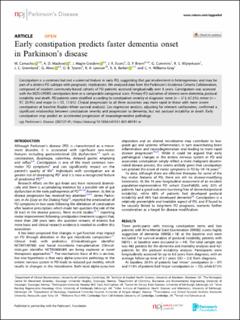Early constipation predicts faster dementia onset in Parkinson's disease
Camacho, Marta; Macleod, Angus D.; Grødem, Jodi Maple; Evans, Jonathan R.; Breen, David P.; Cummins, G; Wijeyekoon, Ruwani; Greenland, Julia; Alves, Guido Werner; Tysnes, Ole-Bjørn; Lawson, Rachel A.; Barker, Roger A.; Williams-Gray, Caroline H.
Journal article, Peer reviewed
Published version

View/
Date
2021Metadata
Show full item recordCollections
- Department of Clinical Medicine [2066]
- Registrations from Cristin [9791]
Abstract
Constipation is a common but not a universal feature in early PD, suggesting that gut involvement is heterogeneous and may be part of a distinct PD subtype with prognostic implications. We analysed data from the Parkinson’s Incidence Cohorts Collaboration, composed of incident community-based cohorts of PD patients assessed longitudinally over 8 years. Constipation was assessed with the MDS-UPDRS constipation item or a comparable categorical scale. Primary PD outcomes of interest were dementia, postural instability and death. PD patients were stratified according to constipation severity at diagnosis: none (n = 313, 67.3%), minor (n = 97, 20.9%) and major (n = 55, 11.8%). Clinical progression to all three outcomes was more rapid in those with more severe constipation at baseline (Kaplan–Meier survival analysis). Cox regression analysis, adjusting for relevant confounders, confirmed a significant relationship between constipation severity and progression to dementia, but not postural instability or death. Early constipation may predict an accelerated progression of neurodegenerative pathology.
